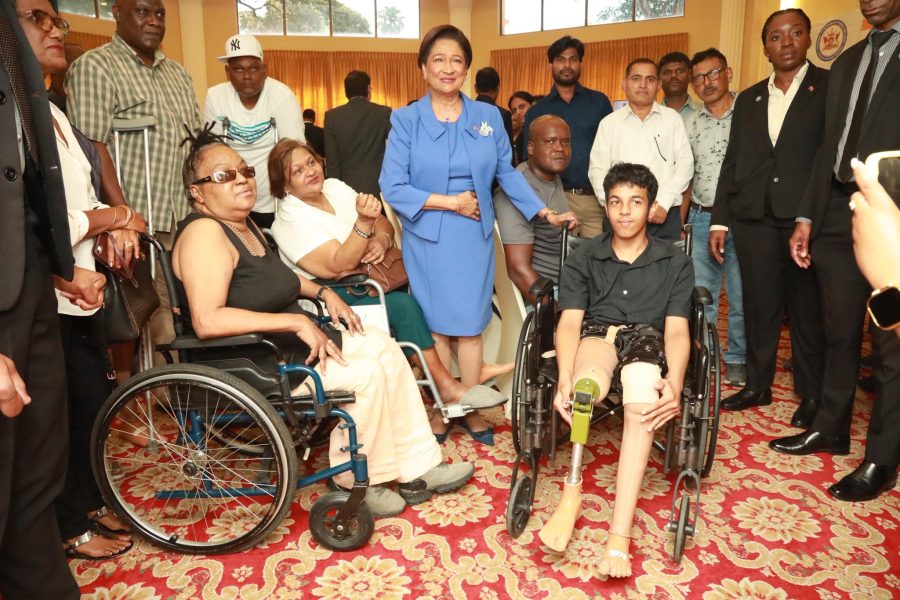Caption: Kamla Persad-Bissessar shares a moment of joy and hope with recipients at the launch of the India–Trinidad and Tobago Artificial Limb Fitment Camp at the Diplomatic Centre, Port of Spain. Photo: Facebbook
By Prior Beharry
MORE than 800 people—most from Trinidad and Tobago—will receive free prosthetic limbs over the next 50 days through an Indian-led initiative launched at the Diplomatic Centre in St Ann’s on Friday.
The Artificial Limb Fitment Camp, operated by the Bhagwan Mahaveer Viklang Sahayata Samiti (BMVSS), also known as Jaipur Foot, officially opened with founder and chief patron Devendra Raj Mehta calling amputees “the most distressed segment of societies.”
He said, “Having lost their limbs, they lost their mobility, they lost their dignity, they lost their income and they lost their social respect,”
Mehta said. “This is what is humanitarian, this is what is universalism. All our brothers, all our sisters, they are in trouble, we have to help them.”
Mehta said a prosthetic leg can cost about US$10,000 in the United States, but his organisation produces and supplies a Jaipur Foot prosthetic for roughly US$30.
India’s High Commissioner to Trinidad and Tobago, Dr Pradeep Rajpurohit, said the camp, based at the National Council of Indian Culture, Divali Nagar in Chaguanas, will run for 50 days. While most beneficiaries are from Trinidad and Tobago, some have travelled from Grenada and Dominica.
Rajpurohit, a medical doctor, said high rates of diabetes in Trinidad and Tobago have contributed to a significant number of amputations.
“Normally we cater for 600 people for camps in fairly large countries,” he said.
“Based on my assessment… we see very high incidences of diabetes here… and I was able to convince my ministry and government to allocate 800 beneficiaries for this camp.”
Rajpurohit said, “Following meetings with Mehta and other officials, Rajpurohit said the partners agreed to establish a permanent limb-fitment centre in Trinidad and Tobago, including training local technicians in India and bringing Indian specialists to the country. This centre probably could work for the entire region.”
Prime Minister Kamla Persad-Bissessar said the camp fulfils a pledge made by India’s Prime Minister Narendra Modi during his recent visit.
“Just three months later, that promise has taken root in Trinidad and Tobago, with containers of lightweight prosthetic limbs shipped from Jaipur,” she said.
Citing Ministry of Health data, Persad-Bissessar noted that Trinidad and Tobago records 350–400 lower-limb amputations annually—mostly linked to diabetes and road traffic injuries—with one in six adults living with diabetes, the second-highest rate in the Americas.
“Too often, a small foot wound spirals into the loss of a limb,” she said.
The prime minister added that amputations carry severe economic costs, reducing household income by 20–40%, while prosthetic limbs can cost between $15,000 and $40,000—often beyond the reach of most families.
She said the Government will support lasting change by providing follow-up care through regional health authorities, including physiotherapy and medical support, and by partnering with Jaipur Foot experts to train local technicians and clinicians so fittings and repairs can be done in-country.
![]()














